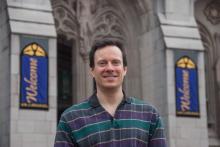You have just returned from your sabbatical, and it seems to have inspired you?
Yes, I did a lot of reading and thinking about “post-truth” politics and how many people today seem to think that truth is whatever feels true within their own filter bubbles.
What is a filter bubble?
The concept refers to how easy it is for all of us to seek out information that confirms our beliefs and people who agree with us. We are then inclined to equate this consensus among our sources with “truth.”
OK, how do we separate fact from fiction?
The first goal of the class is to review what scholars have learned about how people form their opinions. We know, for example, that people do not always update their beliefs when they are exposed to new information. In fact, information that challenges prior beliefs often leads people to cling to those beliefs even more strongly! Other research shows how intuition, perception, and memory can lead us astray. Recognizing these biases is a first step towards evaluating claims through reason and evidence.
This doesn’t really sound like a traditional Political Science course?
Yes and no. Political scientists have been documenting these developments for many years. One example is research on how political polarization is partly elite-driven, but also a product of changes in how people get their information. A few decades ago, we basically had three choices for broadcast news: ABC,NBC and CBS. Now we have virtually unlimited choices but, instead of taking advantage of all of that diversity, we tend to be selective in terms of where we get our political information.
How is this different from other Political Science courses?
It is similar to many other courses in helping students develop critical thinking skills. The unique contribution is that students will become more aware of how their own information processing behaviors can create systematic biases. Knowing these things helps to explain why so many Americans either reject ideas with a strong scientific consensus or accept ideas lacking scientific support. It also helps to explain the appeal of conspiracy theories and how they often seem to form and spread virtually overnight.
Thanks for your time! My pleasure!
